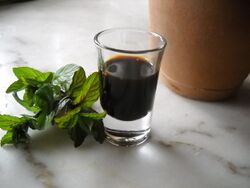Chemistry:Pekmez

Pekmez (Turkish: pekmez) is a molasses-like syrup obtained after condensing juices of fruit must, especially grape by boiling it with a coagulant agent like wood ashes or ground carob seeds. It is used as a syrup or mixed with tahini for breakfast.
Etymology
Pekmez is etymologically Oghuz Turkic in origin and it was called bekmes in the past. The oldest written account of the word is recorded in 1073 dictionary Dīwān Lughāt al-Turk by Mahmud al-Kashgari.[1][2]
History
Fruit molasses, defrutum, goes back to the classical period.[3]
During the Byzantine era, the region of Trapezus (modern Trebizond) grew mulberry trees for silkworms. Local Armenians used mulberries to make a sweet syrup called petmez or pekmez; the Greeks made grape syrup, siraios (σιραίος). After the Byzantine Empire fell, the term petmez replaced the Greek names for grape syrup in Greek, in the form petimezi.[citation needed]
Regional variants
In Turkey, sugar beet (şeker pancarı), figs (incir) or mulberry (dut) are often used, as well as juniper berries (andiz). Pekmez made from carob (keçiboynuz or harnup) is popularly recommended as a treatment for iron deficiency anemia.[4][5] In Azerbaijan, pekmez is made mostly from mulberry, grape, rosehip or pomegranates.
In the Balkans, it is more jam-like in texture and usually made of plums. It usually contains more fruit products and less sugar than jam.[6] In Greece, it is called petimezi (πετιμέζι).
In Arab cuisine, dibs or dibis (in some regions called "robb" or "rubb") is made from pomegranates, grapes, carob,[7] or dates.[3]
See also
- Grape syrup
- List of grape dishes
- List of syrups
- Pomegranate molasses
- Date honey
References
- ↑ "pekmez". https://nisanyansozluk.com/?k=pekmez.
- ↑ TDK Online - Pekmez entry [|permanent dead link|dead link}}]
- ↑ 3.0 3.1 Alan Davidson, ed., The Oxford Companion to Food
- ↑ Sabah, Daily (2017-10-19). "Pekmez: Natural cure-all wonder" (in en-US). https://www.dailysabah.com/feature/2017/10/19/pekmez-natural-cure-all-wonder.
- ↑ Sun, Ernesto. "Pekmez". https://ecovillage.org/solution/pekmez/.
- ↑ Zagreb, N1 (2018-01-12). "Razlika između džema, pekmeza i marmelade" (in sr-RS). https://n1info.rs/lifestyle/a356166-Koja-je-razlika-izmedju-dzema-pekmeza-i-marmelade/.
- ↑ Maan Z. Madina, Arabic-English Dictionary, s.v.
Further reading
External links
